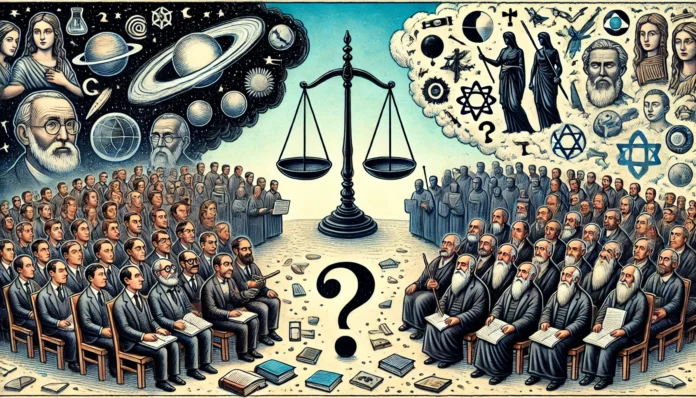Arguments Against God’s Existence: Key Philosophical Debates
Debates about the existence of deities have shaped philosophy, science, and culture for centuries. While theism remains prevalent worldwide, a growing number of individuals find the case for atheism—disbelief in gods—compelling. This article explores the major philosophical arguments atheists use to contend that no deities exist, breaking down key debates and examining why many find atheism convincing. For further reading, see the Stanford Encyclopedia of Philosophy and the Internet Encyclopedia of Philosophy.
The Cosmological Argument and Its Critiques
The cosmological argument posits that everything that exists has a cause, and that this chain of causation must ultimately lead to a first cause—often identified as God. Proponents argue that the universe’s existence requires an explanation beyond itself. However, atheists challenge this argument on several grounds:
- Special Pleading: If everything requires a cause, why is God exempt? This exception appears arbitrary.
- Infinite Regress: Some philosophers argue that an infinite regress of causes is not logically impossible, undermining the need for a first cause.
- Alternative Explanations: Modern cosmology offers naturalistic explanations for the universe’s origins, such as quantum fluctuations, that do not require a deity.
For a deeper dive, see the Stanford Encyclopedia of Philosophy: Cosmological Argument.
The Problem of Evil
One of the most influential arguments against the existence of an all-powerful, all-knowing, and benevolent deity is the problem of evil. If such a god exists, why does unnecessary suffering occur? Atheists and many philosophers argue that the existence of gratuitous evil is incompatible with the traditional concept of God. Key points include:
- Logical Problem: The existence of evil appears logically inconsistent with an omnipotent, omnibenevolent deity.
- Evidential Problem: The sheer amount and variety of suffering in the world make the existence of a benevolent god unlikely.
- Theodicies: While some theists propose justifications (theodicies) for evil, such as free will or soul-making, critics argue these do not account for natural disasters or seemingly pointless suffering.
For more, see the Stanford Encyclopedia of Philosophy: The Problem of Evil.
Pascal’s Wager and Its Limitations
Pascal’s Wager suggests that believing in God is the safest bet: if God exists, believers gain everything; if not, they lose nothing. Atheists and critics highlight several flaws in this reasoning:
- False Dichotomy: The wager assumes only the Christian God is possible, ignoring the multitude of deities humans have believed in.
- Belief as a Choice: Genuine belief cannot be willed simply for pragmatic reasons; belief is not a mere wager.
- Ethical Concerns: The wager encourages belief based on self-interest rather than evidence or sincerity.
For a critical analysis, see the Internet Encyclopedia of Philosophy: Pascal’s Wager.
Arguments from Lack of Evidence
Many atheists argue that the absence of compelling evidence for any deity is itself a strong reason for disbelief. This position is often summarized as: “Extraordinary claims require extraordinary evidence.” Key aspects include:
- Burden of Proof: The burden lies with those making the claim (i.e., that a god exists), not with skeptics.
- Analogy to Other Claims: Just as we do not believe in unicorns or fairies without evidence, atheists see no reason to believe in gods without proof.
- Empirical Standards: Scientific and philosophical standards demand evidence before accepting extraordinary claims.
For more on this approach, see the Stanford Encyclopedia of Philosophy: Atheism and Agnosticism.
Arguments from Logical Contradictions
Some atheists contend that the concept of God, as defined by many religions, is logically incoherent. Examples include:
- Omnipotence Paradox: Can an all-powerful being create a stone so heavy that even it cannot lift it? If yes, then there is something it cannot do; if no, then it is not all-powerful.
- Omniscience vs. Free Will: If God knows everything, including future human actions, how can humans have free will?
- Incompatible Properties: Attributes like omnibenevolence, omnipotence, and omniscience may be mutually incompatible when examined closely.
For further reading, see the Internet Encyclopedia of Philosophy: Omnipotence Paradox.
Why Many Find the Case for Atheism Convincing
Atheism’s appeal often lies in its commitment to reason, evidence, and intellectual honesty. Many find that the arguments for theism do not withstand critical scrutiny, while the arguments against the existence of deities are robust and multifaceted. The willingness to question deeply held beliefs and demand evidence is seen as a virtue by many atheists and secular thinkers.
For those interested in exploring these debates further, reputable resources such as the Stanford Encyclopedia of Philosophy and the Internet Encyclopedia of Philosophy offer comprehensive overviews and in-depth analyses. The philosophical conversation continues to evolve, inviting all to engage with the evidence and arguments on their own terms.

